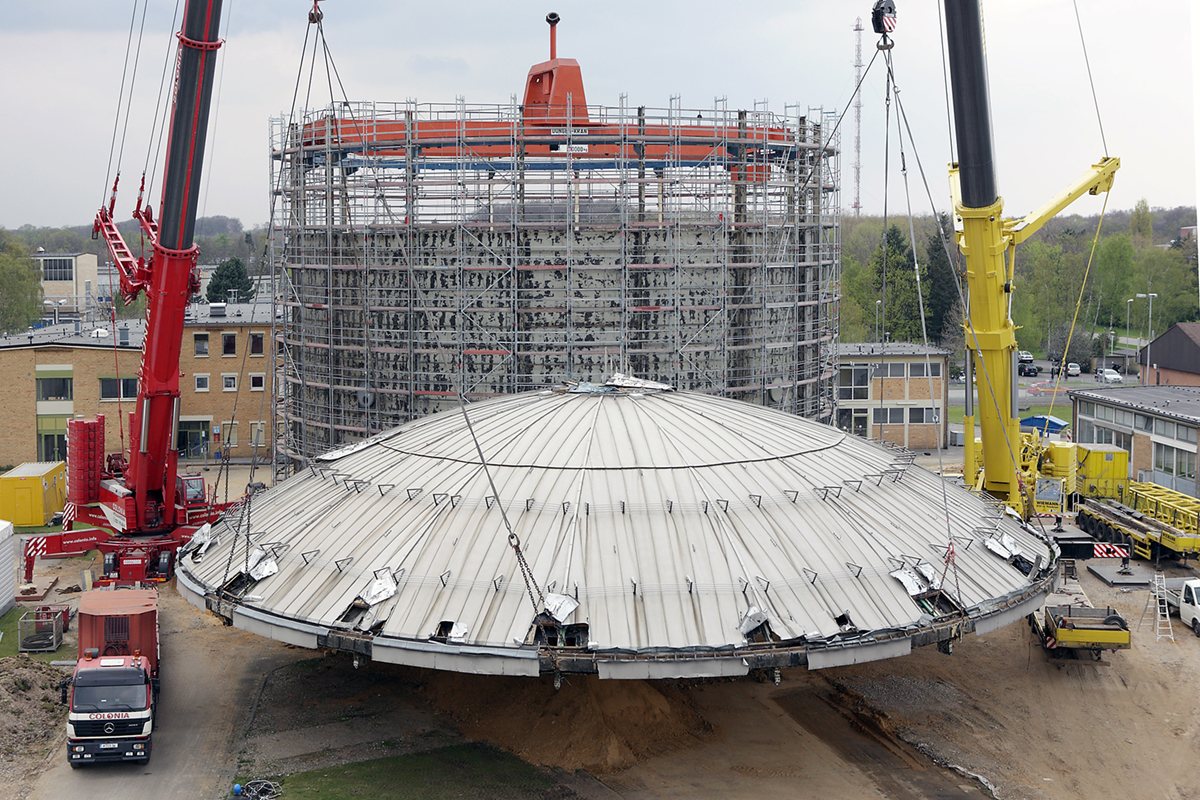IAEA Calls for Papers for a Major Conference on Decommissioning and Environmental Remediation
Workers dismantling a steam generator from a WWER 440 unit at
Unit 5 of the Greifswald plant in Germany. The importance of
environmental remediation and decommissioning cannot be emphasized
enough at the time when slightly more than half of all the operating
nuclear power reactors are more than 30 years old. (Photo: H.
Vanhatalo/IAEA)
What happens to a nuclear facility or a site after it served its
purpose? This question will be the focus of a major IAEA event taking
place in Madrid, Spain from 23 to 27 May 2016. The International Conference on Advancing the Global Implementation of Decommissioning and Environmental Remediation Programmes
will enable participants to share and review challenges, achievements
and lessons learned related to decommissioning and environmental
remediation programmes that have been implemented during the past
decade. Participants interested in making a presentation have until 16
November 2015 to submit paper abstracts through the conference web site.
“Much remains to be done in terms of addressing the legacies from the early development of nuclear energy, including the dismantling of research and fuel cycle facilities, research reactors and nuclear power plants,” said Patrick O’Sullivan, a decommissioning specialist from the IAEA Department of Nuclear Energy and one of the Scientific Secretaries of the conference. “The same goes for the remediation of sites affected by past uranium mining and processing, by other activities involving the use of naturally occurring radioactive material or by major nuclear or radiological accidents.”
The last major conference on decommissioning organized by the IAEA was in 2006 and on environmental remediation in 2009. Significant developments in these areas have since taken place in some countries and it is now timely to reflect on the current status of programmes and to exchange lessons learned. Often, long term solutions are yet to be found for managing the resulting waste, including the development of disposal facilities that meet public acceptance and safety requirements. Some countries are moving forward with dealing with these legacies but many national programmes still face significant challenges.
“Decommissioning and environmental remediation are in many respects closely related,” O’Sullivan said. “Addressing both issues in one conference is a recognition that significant synergies exist between them, which should be explored to boost implementation of both activities across the world.”
The conference will enable participants to share and review challenges, achievements and lessons learned related to decommissioning and environmental remediation programmes that have been implemented during the past decade. Key goals will include raising awareness of the importance of addressing the legacies from past activities; identifying current priority needs; and providing recommendations on the approaches that can enable and enhance safe, secure and cost-effective implementation of national and international programmes.
The conference will bring together both policy makers and technical experts concerned with planning and implementing decommissioning and remediation programmes and projects. Representatives from national and local governments, funding organizations, regulatory authorities, public health authorities, facility operators, waste management bodies and international organizations will make up the key audience.
“Much remains to be done in terms of addressing the legacies from the early development of nuclear energy, including the dismantling of research and fuel cycle facilities, research reactors and nuclear power plants,” said Patrick O’Sullivan, a decommissioning specialist from the IAEA Department of Nuclear Energy and one of the Scientific Secretaries of the conference. “The same goes for the remediation of sites affected by past uranium mining and processing, by other activities involving the use of naturally occurring radioactive material or by major nuclear or radiological accidents.”
The last major conference on decommissioning organized by the IAEA was in 2006 and on environmental remediation in 2009. Significant developments in these areas have since taken place in some countries and it is now timely to reflect on the current status of programmes and to exchange lessons learned. Often, long term solutions are yet to be found for managing the resulting waste, including the development of disposal facilities that meet public acceptance and safety requirements. Some countries are moving forward with dealing with these legacies but many national programmes still face significant challenges.
“Decommissioning and environmental remediation are in many respects closely related,” O’Sullivan said. “Addressing both issues in one conference is a recognition that significant synergies exist between them, which should be explored to boost implementation of both activities across the world.”
The conference will enable participants to share and review challenges, achievements and lessons learned related to decommissioning and environmental remediation programmes that have been implemented during the past decade. Key goals will include raising awareness of the importance of addressing the legacies from past activities; identifying current priority needs; and providing recommendations on the approaches that can enable and enhance safe, secure and cost-effective implementation of national and international programmes.
The conference will bring together both policy makers and technical experts concerned with planning and implementing decommissioning and remediation programmes and projects. Representatives from national and local governments, funding organizations, regulatory authorities, public health authorities, facility operators, waste management bodies and international organizations will make up the key audience.


No comments:
Post a Comment